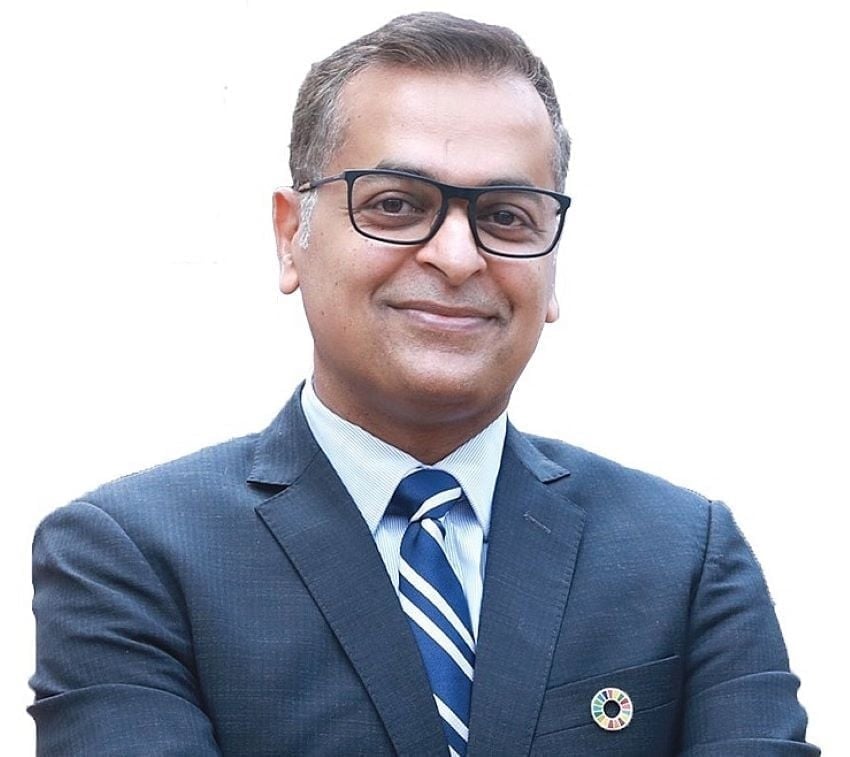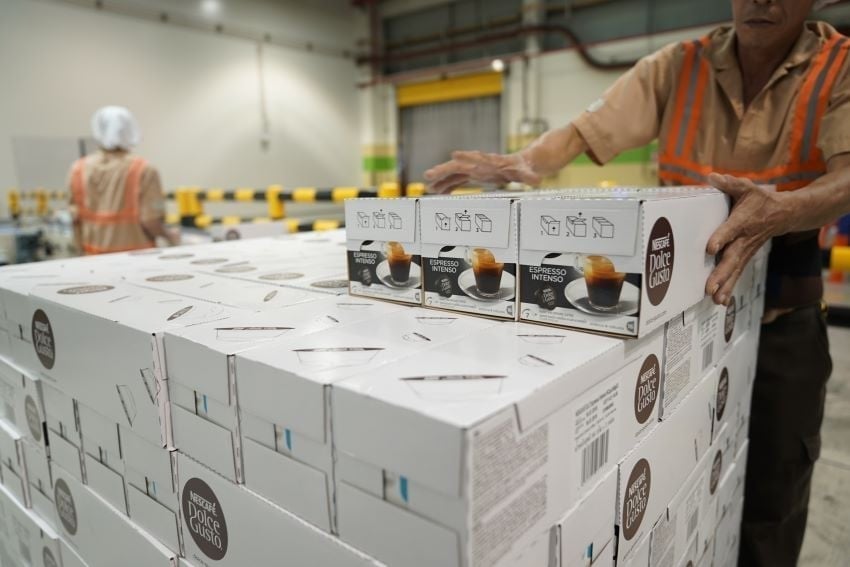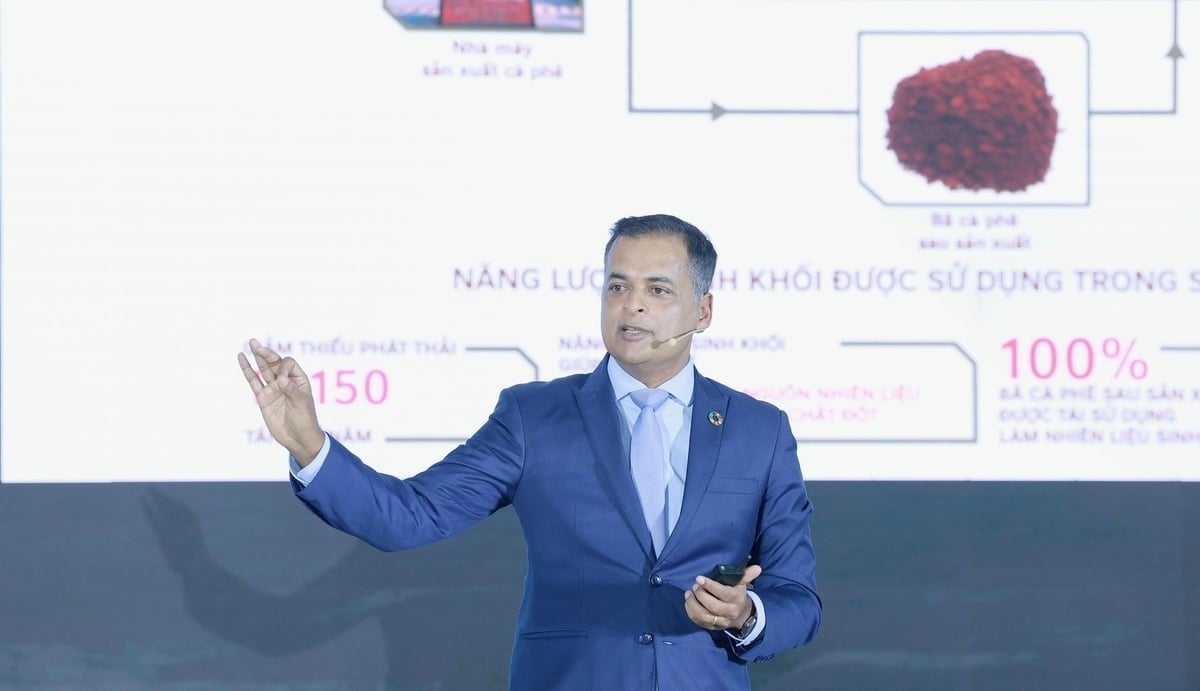May 30, 2025 | 18:24 GMT +7
May 30, 2025 | 18:24 GMT +7
Hotline: 0913.378.918
May 30, 2025 | 18:24 GMT +7
Hotline: 0913.378.918

Mr. Binu Jacob, General Director of Nestlé Vietnam.
VAN News:How is Nestlé Vietnam implementing the circular economy model across the company's factories and products, sir?
Mr. Binu Jacob: To successfully transition to the circular economy model, three principles must be ensured, beginning with changes in product design. These include eliminating waste and pollution, extending the lifecycle of products and materials, and regenerating natural ecosystems.
At the same time, businesses need to implement this model in five stages, including improving product design to increase recyclability and reusability, minimizing waste generation during production, consuming resources responsibly, managing waste effectively, and converting waste into valuable material resources through reuse and recycling. Among these, product design plays a critical role, as it enables waste reduction even before the product reaches the consumer.
In Vietnam, Nestlé is among the pioneering companies implementing initiatives to reduce emissions and protect resources. In recent times, Nestlé has enhanced its packaging designs to eliminate unnecessary components, reduce the use of primary plastics, and replace them with eco-friendly materials, thereby increasing the proportion of recycled materials in its product packaging.
Notable initiatives by Nestlé Vietnam include the use of regenerated PE plastic for NESCAFÉ product packaging and the transition from single-use plastic straws to Sustainable Forest Management (FSC)-certified paper straws for all ready-to-drink products. Nestlé Vietnam is also aiming for single-layer packaging to recycle more easily.
In production, the implementation of the circular economy model has helped all of Nestlé Vietnam's factories achieve a target of "zero waste to landfill" since 2015 through waste collection, sorting, recycling, and reuse.
Currently, 100% of coffee grounds generated from Nestlé Vietnam’s production are reused as biomass materials, helping to reduce gas consumption and CO2 emissions. Non-hazardous sludge from production activities, after being treated, is also used to produce fertilizer. Waste sand from boilers is supplied to local manufacturers of unbaked bricks for use in construction projects.
The water management system is also upgraded to save and reuse effectively, helping to reduce pressure on water resources. In addition, Nestlé also accelerates the use of renewable energy, such as solar power, and commits to achieving net-zero emissions by 2050.

The Nescafé Dolce Gusto pellet production line at the Nestlé Tri An factory.
In addition, Nestlé Vietnam has launched a range of awareness-raising campaigns at selling points and schools and on digital platforms to help consumers understand the value of waste classification and responsible consumption. The communication work not only supports recycling goals but also contributes to building a long-term sustainable consumer culture.
We believe that integrating principles of the circular economy into product design and production systems is an essential step not only for businesses but also for the whole society's sustainable development.
VAN News: How have the implementation of the circular economy and the promotion of regenerative agriculture contributed to building Nestlé Vietnam’s brand image in recent times, sir?
Mr. Binu Jacob: Over the past few years, Nestlé Vietnam has been a pioneer in implementing circular economy and regenerative agriculture, contributing to enhancing the company’s brand image, creating a competitive advantage, and demonstrating its commitment to the environment and the community. The company not only focuses on producing high-quality products but also strives for sustainable development, aiming to protect natural resources and enhance people's lives.
The Nescafé Plan is a practical example of how we continue to expand our sustainability strategy not only in production but also in agriculture. To date, the project has supported 21,000 households in sustainable coffee farming according to the 4C standard. As a result, these farmer households have reduced their irrigation water use by 40–60%, decreased chemical fertilizer use by 20%, and increased their incomes by 30–150% through the adoption of reasonable intercropping models. The project has also helped reduce carbon emissions per kilogram of harvested coffee.
Thanks to the results achieved through these efforts, Nestlé Vietnam has established a reputation as a brand that is responsible for the environment and society. The company not only creates safe and quality products but also provides peace of mind to consumers. At the same time, these sustainability initiatives create long-term value for the community and affirm Nestlé’s pioneering role in green development.
With clear orientation and solid steps, Nestlé Vietnam continues to demonstrate that business can be conducted in harmony with environmental protection. The company continually expands its sustainable solutions to contribute to building a greener future for the next generation.
VAN News: What plans does Nestlé Vietnam have to promote the circular economy and regenerative agriculture both within the company and among its partners and farmers in the coming years?
Mr. Binu Jacob: We acknowledge that building a sustainable future through the promotion of the circular economy and the transition to regenerative agricultural cultivation requires close collaboration among all parties, including the Government, the business community, and consumers.

Mr. Binu Jacob, General Director of Nestlé Vietnam, shared that Nestlé Vietnam has built an image of a brand responsible for the environment and society. Photo: Nestlé Vietnam.
At Nestlé Vietnam, we view our sustainable development strategy, which promotes a circular economy and regenerative agriculture, as a driving force for creating value and enhancing competitiveness for our businesses. Thus, these goals are always integrated with the company's business strategy, motivated by the board of directors, and deployed to each department and staff as well as the company's activities.
Additionally, Nestlé has turned sustainability into a core value proposition by collaborating with communities, partners, management agencies, and consumers to implement specific programs and initiatives that promote multi-party cooperation. The company is currently a founding member of the Packaging Recycling Organization Vietnam (PRO Vietnam), a co-chair of the Vietnam Business Council for Sustainable Development (VBCSD), a co-chair of the Partnership for Sustainable Agriculture in Vietnam (PSAV), and vice chairman of the EuroCham Green Growth Sector Committee.
VAN News: What are your expectations for the role of communication in spreading and promoting the circular economy and environmental protection among businesses and consumers' green consumption awareness?
Mr. Binu Jacob: I firmly believe that effective communication plays a crucial role in the economic green transition journey. Because all sustainable actions require consensus and joining hands from the community, and communication is the most powerful bridge to build that consensus.
That is why Nestlé Vietnam implements numerous communication activities to raise awareness and change consumer behavior, including a series of programs such as "Say No to Single-Use Plastic" and "Collection and Sorting of Used Packaging."
In parallel with raising awareness of responsibility and role in the fight against climate change and reducing emissions, Nestlé Vietnam also organizes numerous programs to support training and measuring greenhouse gas emissions, helping businesses in the supply chain to reduce emissions and enhance competitiveness. This thereby expands access to the international market.
Through Nestlé Vietnam's meaningful initiatives, we also encourage collaboration with management agencies, businesses, and organizations to more widely communicate these initiatives and good practices, thereby contributing to the creation of a greener, more prosperous Vietnam.
VAN News: Thank you, sir!
Translated by Thu Huyen

(VAN) Several scientists and farmers are experimenting with soil treatment in some key durian-growing regions such as Cai Lay (Tien Giang), Dak Song, Gia Nghia, and Dak R’lap (Dak Nong).
/2025/05/25/4127-3-073637_820.jpg)
(VAN) Thanks to the promotion from an FAO-implemented project, vegetable production in greenhouses in Moc Chau has seen strong development, from 1.5 hectares in 2021 to nearly 50 hectares in 2024.

(VAN) FAO has recently supported USD 140,000 to implement the project 'Risk mitigation human-animal interface risks through disease control initiatives in pig farming.'

(VAN) The People's Committee of Tra Vinh province has approved an adjustment to the investment policy for the Green Hydrogen Plant project, increasing its area to approximately 52.76 hectares.
![Reducing emissions from rice fields: [2] Farmers’ commitment to the soil](https://t.ex-cdn.com/nongnghiepmoitruong.vn/608w/files/news/2025/05/05/dsc08881jpg-nongnghiep-140632.jpg)
(VAN) Clean rice cultivation model in Thuong Tan commune, Bac Tan Uyen district, is assisting local residents in achieving sustainable agriculture by substantially reducing costs, increasing productivity, and protecting the environment.

(VAN) At the conference to disseminate Resolution No. 68, AgriS introduced its digital agricultural ecosystem and reaffirmed its commitment to accompanying the Government in promoting private sector development and sustainable agriculture.

(VAN) 'Blue Ocean - Blue Foods' initiative is designed to restore marine ecosystems and establish sustainable livelihoods for local communities by cultivating a minimum of 1,000 hectares of cottonii seaweed in the first three years.